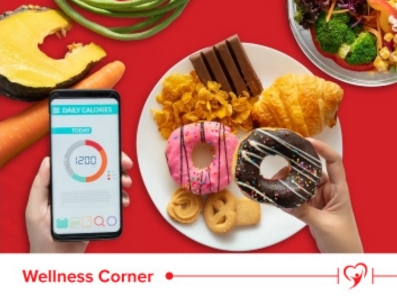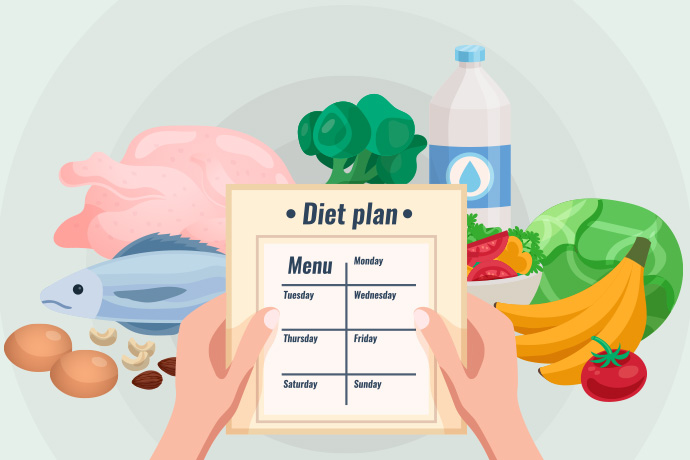

Calorie Calculator
A calorie calculator is a tool that will help you estimate the number of calories you should consume in a day to maintain your current weight or gain or lose weight. It will calculate the calorie intake based on your age, gender, height, weight, and level of physical activity.
However, the calorie calculator can give an approximate estimate because your daily calorie needs depend on your activity levels and other factors. So, your dietician or doctor can best help with an ideal calorie intake guide based on your health status and weight gain or loss goals.

What Are Calories?
The unit used to measure energy is called a calorie. Simply put, calories refer to the amount of energy that you get from food or beverages. You can know the calorie count of fats, proteins, carbohydrates, etc., from the nutrition labels of packaged foods. There are two categories of calories — small (cal) and big (Cal). One Cal, also known as a kilogram calorie, is equal to 1,000 small calories. Kilocal is the most commonly used unit in nutrition.
To know how many calories you should consume in a day to maintain your current weight, you need to first calculate your Basal Metabolic Rate (BMR) with the help of a calorie maintenance calculator and then multiply it by physical activity level (PAL). The term PAL refers to a person’s daily physical activity. The adult PAL is generally 1.20 to 2.40.
PAL is calculated by dividing an individual’s total energy expenditure (TEE) by his/her BMR. TEE includes the energy used for physical activity and digestion, as well as the energy used at rest. For example, if an individual’s BMR is 1500 calories per day and TEE is 2000 calories per day, the person’s PAL would be 1.33 (2000/1500).
PAL is an important factor to consider when calculating an individual’s daily calorie needs, as those with a higher PAL require more calories to maintain their weight than those with a lower PAL. It is also an important factor to consider when creating a personalised exercise and activity plan, as it can help individuals determine how much physical activity they need to achieve their goals.
How Many Calories Do You Need?
The daily calorie requirement or the number of calories a person needs to remain healthy depends on several factors, such as age, sex, weight, height, levels of physical activity, metabolism rate, and whether one wants to lose weight or for weight management.
According to the U.S. Department of Health, women should consume around 1600-2000 calories per day and men 2000-2500 calories. Also, as we age, our metabolism slows down; hence, older people require fewer calories than younger adults. For example, a physically active 25-year-old male with a height of 6 feet needs more calories compared to a 70-year-old woman who has a sedentary lifestyle with no physical activity.
Similarly, if your goal is to lose weight, you should consume fewer calories than your normal calorie intake. But do not drastically cut down on your calorie intake as it can lead to side effects and affect your health, increasing the risk of nutritional deficiencies. So, whether your goal is to maintain your current weight or gain or lose some pounds, ensure you consume enough calories that your body needs from nutrients to stay fit and healthy. You can take the help of a calorie calculator, maintain a cal chart, or talk to your dietician to know your exact calorie requirement.

How Our Calorie Calculator Works ?
Our calorie calculator is based on the Mifflin St-Jeor equation. The results of this calculator are based on an estimated average. It allows you to find your basal metabolic rate (BMR) – the amount of energy needed for your body to support only its basic vital functions. It differs for men and women.
Mifflin-St Jeor Equation:
BMR for men = (10 X Weight in kg) + (6.25 X Height in cm) – (5 X Age in years) + 5
BMR for women = (10 X Weight in kg) + (6.25 X Height in cm) – (5 X Age in years) - 161
After you calculate your BMR, you need to multiply it by a factor corresponding to your physical activity level.
Physical Activity Level (PAL) Categorization
PAL Is Typically Categorised Into One Of Six Levels:
• Sedentary lifestyle (little or no exercise): 1.2
• Slightly active lifestyle (light exercise/sports 1-2 days/week): 1.4
• Moderately active lifestyle (moderate exercise/sports 2-3 days/week): 1.6
• Very active lifestyle (hard exercise/sports 4-5 days a week): 1.75
• Extra active lifestyle (very hard exercise, physical job or sports 6-7 days/week): 2.0
• Professional Athlete :2.3
If you're not sure which activity level to choose, always go for a lower number. That's because people judge the intensity of their activities differently & most people overestimate how much they exercise. So, if you want to lose weight, it's safer to assume that you are not as active as you'd expect yourself to be.
Let Us Understand With The Help Of An Example.
Let’s say 25-year-old Ananya wants to maintain her weight which is 62 kg. Her height is 168 cm, and her PAL is 1.4. She hasn’t lost any weight recently because she goes for a walk occasionally. With the given inputs, first, we have to calculate Ananya’s BMR using the Mifflin-St Jeor formula.
Bmr (Kcal/Day) =(10 X 62 Kg )+ (6.25 X 168 Cm) – (5 X 25) - 161 = 1384
Ananya’s total calorie requirement is calculated by multiplying BMR and her PAL, i.e., 1384 x 1.4 = 1937.6.
So, Ananya needs to consume 1937.6 kcal per day to maintain her weight.
However, the best way to lose weight, as advised by experts, is a proper diet along with exercise. It’s also unhealthy to lower your intake to more than 1000 calories per day, the ideal being 500-1000 calories. Consumption of lesser calories can have side effects and affect your metabolic rate.
Compared to other equations i.e. Harris-Benedict Equation and Katch-McArdle Formula, the Mifflin St-Jeor equation is considered the most accurate equation for calculating BMR. However, for people who are leaner and know their body fat percentage the Katch-McArdle Formula can be more accurate. It’s important to note that even the most accurate formula can only provide an estimate, as individual metabolism can vary based on genetics, body composition, and other factors.
The Other Equations Are:
What Is A Calorie Deficit?
Our body needs a certain number of calories to maintain weight and function normally. When we consume fewer calories than what our body requires to maintain the current weight, it is called a calorie deficit. In other words, a calorie deficit means consuming fewer calories than you burn. A calorie deficit of 500-1000 per day is considered safe for healthy weight loss. Your diet is not the only way to burn calories; you can also burn calories by increasing your physical activity or combining both diet and exercise. One kg equals 7,000 calories, so if you aim to lose 1 kg in a week, you have to create a calorie deficit of 1000 per day. A calorie-deficit diet is recommended for those who want to lose weight.
What Happens When Calories Are Too Low?
If your calorie intake is too low, it could lead to physical, mental, and emotional health issues such as:
- • Fatigue because your energy levels go down
- • Constant hunger pangs
- • Sleep issues
- • Hair loss
- • Brittle nails
- • Imbalance in electrolytes, especially deficiency of proteins
- • Anaemia
- • Dizziness
- • Trouble concentrating
To lose weight, an individual needs to consume fewer calories than they burn through daily activities and exercise. The weight loss calorie calculator estimates how many calories an individual should consume based on their current weight, goal weight, and weight loss timeline. The calculator may also provide recommendations for a daily calorie deficit. A weight loss calorie calculator is a tool that estimates the number of calories an individual needs to consume each day to reach their desired weight loss goal.
What To Eat For Fat Loss
When it comes to fat loss, several foods can help support weight loss goals. Here are some examples:
It’s important to remember that weight loss is not just about eating specific foods but also about creating a calorie deficit through a healthy diet and regular exercise. The calorie deficit calculator, weight loss calorie calculator or calorie maintenance calculator are helpful in this regard.
Calories In Common Foods
Some common foods which we consume every day are listed below.
| FOODS | AMOUNT IN GRAMS | CALORIES PER SERVING |
|---|---|---|
| Spinach | 100 | 24 |
| Bottle Gourd | 100 | 15 |
| French Beans | 100 | 24 |
| Capsicum | 100 | 16 |
| Bitter Gourd | 100 | 21 |
| Pumpkin | 100 | 23 |
| Drumsticks | 100 | 67 |
| Oats | 100 | 389 |
| Greek Yoghurt | 100 | 59 |
| Lean Meat | 100 | 160 |
| Cottage Cheese | 100 | 98 |
| Legumes | 100 | 81 |
| Watermelon | 100 | 30 |
| Boiled Eggs | 100 | 155 |
| Rice | 100 | 130 |
| Potatoes | 100 | 77 |
| Avocado | 100 | 160 |
| Dried Fruits | 100 | 359 |
| Cereals | 100 | 379 |
Calories Burned From Common Exercises
Let’s see how many calories you can burn with 1 hour of exercise every day
| EXERCISE | CALORIES |
|---|---|
| Walking | 300-400 |
| Jogging | 500-600 |
| Swimming | 500 |
| Running | 700 |
| Cycling | 400-700 |
| Weight Lifting | 200-300 |
| Rope Skipping | 800-1000 |
| Golf | 200-300 |
Burning calories naturally helps you stay fit and healthy. A weight loss calculator can help you check the approximate number of calories burned by estimating your total daily energy expenditure (TDEE). TDEE is the total number of calories your body burns in a day, including the calories burned through basal metabolic rate (BMR) and physical activity.
Read Latest Wellness Blogs
Frequently Asked Questions
1. How many calories should I consume per day?
The number of calories that you need in a day depends on your age, weight, height, gender and activity levels. It also depends on whether you want to increase, lose, or maintain your current weight. You can use a calorie calculator to know how many calories your body needs based on your Basal Metabolic Rate (BMR) and physical activity level.
2. What are some common exercises to burn calories?
Some common physical activities that help burn calories are walking, running, jogging, swimming, cycling, etc.
3. How many calories can I burn with 30 minutes of walking?
This depends on your walking pace and current weight. For instance, a person weighing between 50 and 60 kg can burn 100 - 180 calories depending on the walking speed. Similarly, if a person’s weight is between 60 and 70 kg, he/she can burn anywhere from 112 to 214 calories.
4. How many calories should I consume per day to lose weight?
To lose weight, the number of calories that you should consume in a day must be about 500 calories less than what you need to maintain your current weight. But do not drastically cut down calories because our body needs a certain minimum amount of calories to function properly. It is best to consult your dietician or doctor before taking any steps.
5. Which fruit has the maximum calories?
Avocados have the most calories. One hundred grams of avocados contain 150 -167 calories. Other high-calorie fruits are bananas, dates, raisins, and coconut pulp.
Published on 11 October 2023
Based on research by Mifflin MD, St Jeor ST, Hill LA, Scott BJ, Daugherty SA, Koh YO. “A new predictive equation for resting energy expenditure in healthy individuals“ The American Journal of Clinical Nutrition (February 1990).
Last updated: Oct 11, 2023
References:
- https://www.calculator.net/calorie-calculator.html
- https://www.calculator.net/fitness-and-health-calculator.html
- https://www.freedieting.com/calorie-calculator
- https://www.healthline.com/nutrition/how-many-calories-per-day
- https://www.health.harvard.edu/staying-healthy/foods-that-fight-fat
- https://www.everydayhealth.com/weight/fewer-calories-stalls-metabolism.aspx
- https://skalefitness.com/indian-food-calorie-chart/
- https://www.omnicalculator.com/health/maintenance-calorie
- https://www.healthifyme.com/blog/calorie-calculator/
- https://www.omnicalculator.com/health/bmr-harris-benedict-equation
- https://www.calculator.net/bmr-calculator.html
Disclaimer: This blog provides general information and discussions about health and related subjects. The information and other content provided in this blog, website or in any linked materials are not intended and should not be considered, or used as a substitute for, medical advice, diagnosis or treatment. Kindly contact your Doctor before starting a new medicine or health regime.
 Please fill the details.
Please fill the details.















































 Health Insurance
Health Insurance  Travel Insurance
Travel Insurance  Car Insurance
Car Insurance  Cyber Insurance
Cyber Insurance  Critical Illness Insurance
Critical Illness Insurance
 Pet Insurance
Pet Insurance
 Bike/Two Wheeler Insurance
Bike/Two Wheeler Insurance  Home Insurance
Home Insurance  Third Party Vehicle Ins.
Third Party Vehicle Ins.  Tractor Insurance
Tractor Insurance  Goods Carrying Vehicle Ins.
Goods Carrying Vehicle Ins.  Passenger Carrying Vehicle Ins.
Passenger Carrying Vehicle Ins.  Compulsory Personal Accident Insurance
Compulsory Personal Accident Insurance  Travel Insurance
Travel Insurance  Rural
Rural